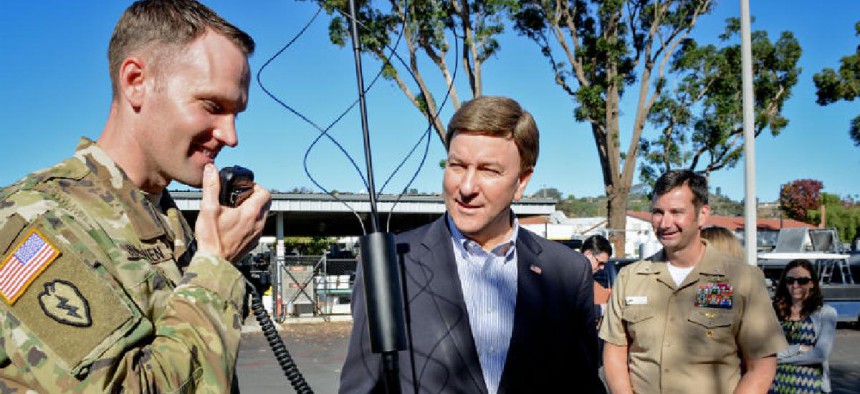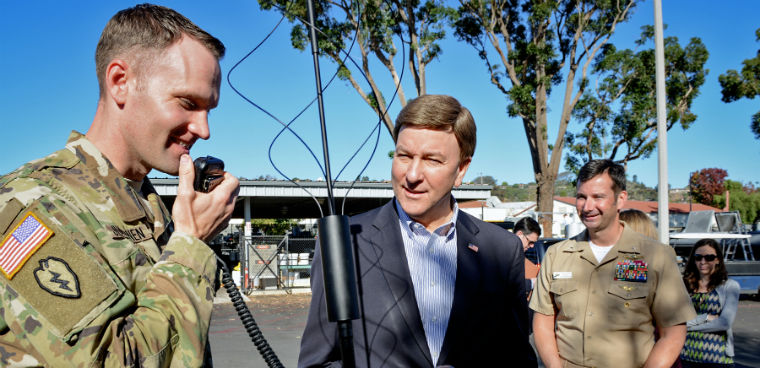Rogers warns on 'stovepiped' cybersecurity

The ranking member of the House Homeland Security Committee said agencies should be coordinating their cybersecurity efforts under CISA's direction and leadership.

Rep. Mike Rogers (center), shown here in a 2016 visit to a Navy facility, is concered that CISA isn't operating as the government's central cybersecurity office. (Photo credit: Alan Antczak/ Naval Information Warfare Center Pacific)
Rep. Mike Rogers (R-Ala.) warned that the proliferation of cybersecurity-focused offices across government may be undermining the government's lead cyber agency and result in "stovepiping" of federal activities.
During an Oct. 24 speech at a cybersecurity conference hosted by Scoop News Group, Rogers called the passage of the Cybersecurity and Infrastructure Security Act one of the most important pieces of legislation he's been involved with and said he was "working closely" with CISA to ensure it is stood up correctly and has the necessary resources and authorities.
However, he expressed concern about similar offices popping up at other agencies, saying it could lead to some of the same dispersion of cyber authorities that initially caused lawmakers to work on establishing a centralized agency at the Department of Homeland Security in the first place.
"What does concern me is that other departments and agencies are creating their own cybersecurity offices," said Rogers, who serves as ranking member of the House Homeland Security Committee. "We can't have multiple agencies undermine each other, stovepiping is not the solution. Congress created CISA to lead the federal government, and we need to ensure that happens."
After his speech, Rogers told reporters that he was referencing offices like the Office of Cybersecurity, Energy Security and Emergency Response (CESER) at the Department of Energy, which works to secure U.S. energy infrastructure against digital and non-digital threats. He also clarified that his beef was not that these other offices existed, but rather that their activities should be carried out under the leadership of CISA and involve constant communication between each entity.
"CISA needs to be in charge of this, we don't need to have three different agencies or five different agencies," he said. "They can have cybersecurity systems as long as it's under CISA, so it's one entity."
Suzanne Spaulding, who led CISA's predecessor agency, the National Protection and Programs Directorate, told FCW last year that the government has effectively centralized such authorities where they make sense but argued that sector-specific agencies like Energy still carry institutional knowledge about their cyber missions that cannot be duplicated at other agencies. Referencing Rogers' comments, she agreed that CISA should be leading those efforts.
Later at the same event, CISA Director Chris Krebs told FCW that Rogers' concerns are likely a product of his role overseeing cyber issues across the Departments of Homeland Security, Commerce, Energy and other agencies. He said it was "a good thing" that sector-specific agencies are creating their own capabilities, but cited previously observed campaigns by Russia and other nations targeting the energy sector as an example of why those efforts must be unified across the federal government to be effective.
"Go back and look at some of these attacks that are have taken place or these coordinated campaigns out of Russia … targeting the energy sector, but they were coming up through the supply chain, hitting construction companies, managed service providers," he said. "There's no way that an individual department or agency could figure that all out on their own. So there's got to be somebody that's pulling together the big picture and how that's transpiring across critical infrastructure … to again create that common operating picture."
The debate over just how centralized or dispersed civilian cybersecurity authorities should be across federal agencies has been going on for years. Earlier versions of the legislation that created CISA explicitly spelled out the agency's preeminent role to "lead national efforts to protect and enhance the security and resilience of the cyber and critical infrastructure of the United States." The version that eventually passed into law in 2018 used different language calling for the agency to lead cyber and critical infrastructure security efforts at the agency and coordinate with other federal and non-federal entities.
Some have called for Congress to go further by creating a new federal cabinet-level department or agency dedicated to the issue. Others, like former DHS Secretary Kirstjen Nielsen, have argued that CISA is for all intents and purposes the Department of Cybersecurity.
Over the past year, the agency has gone on a hiring spree for cybersecurity specialists, taken the technical lead on protecting the nation's oil and gas pipelines from digital attacks, absorbed much of the technical work for the Office of Management and Budget cybersecurity reviews of other agencies and expanded in assisting state and local governments and the private sector.


